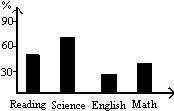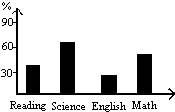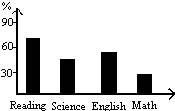题目内容
Many Going to College Are Not Ready
Only about half of this year’s high school graduates have the reading skills they need to succeed in college, and even fewer are prepared for college-level science and math courses, according to a yearly report from ACT, which produces one of the nation’s leading college admissions tests.
The report, based on scores of the 2005 high school graduates who took the exam, some 1.2 million students in all, also found that fewer than one in four met the college-readiness benchmarks (基准)in all four subjects tested: reading comprehension, English, math and science.
ACT sets its college-readiness benchmarks — including the reading comprehension benchmark, which is new this year—by correlating(联系)earlier students’ ACT scores with grades they actually received as college freshmen. Based on that data, the benchmarks indicate the skill level at which a student has a 70 percent likelihood(可能性)of earning a C or better, and a 50 percent chance of earning a B or better.
Among those who took the 2005 test, only 51 percent achieved the benchmark in reading, 26 percent in science, and 41 percent in math; the figure for English was 68 percent. Results from the new optional ACT writing test, which was not widely taken this year, were not included in the report.
About 40 percent of the nation’s 2005 high school graduates took the ACT, and the average overall score was unchanged from the year before. Minority students make up 27 percent of all ACT test takers. Besides, there are also other worrying trends in the ACT report as well, including a continuing decline in the percentage of students planning to major in engineering, computer science and education.
50. The report from ACT mainly tells readers the problem that ______.
A. few minority students graduates took ACT
B. many who intend to go to college are not ready
C. the college-readiness benchmarks is high this year
D. the tests for some subjects are too difficult
51. According to the benchmarks in 2005, about how many students will not earn C?
A. 30 percent. B. 70 percent. C. 50 percent. D. 26 percent.
52. Which of the following pictures can correctly show the numbers of the students who achieve the benchmark in different subjects?
A.
 B.
B.
C.
 D.
D.
53. Which of the followings can be found in the report from ACT in 2005?
A. The report about the writing test is very objective.
B. More boy students are not good at science and math.
C. The percentage of students majoring science declined.
D. The average score of 2005 ACT participants changed greatly.
50---53 BADC
略

练习册系列答案
 小学生10分钟口算测试100分系列答案
小学生10分钟口算测试100分系列答案
相关题目


 ich remains unchanged over a period of time, and which makes the individual behave regularly in a variety of situations, is what is meant by an attitude.
ich remains unchanged over a period of time, and which makes the individual behave regularly in a variety of situations, is what is meant by an attitude. periences of success and pleasure, as when someone acquires a posi
periences of success and pleasure, as when someone acquires a posi tive attitude toward doing crossword puzzles by being able to complete some of them. And frequently, they are learned by copying other people’s behavior, as when a child learns how to behave toward foreigners by observing the actions of his parents. Regardless of these differences, there is something in common in the learning and modification(修正)of attitudes.
tive attitude toward doing crossword puzzles by being able to complete some of them. And frequently, they are learned by copying other people’s behavior, as when a child learns how to behave toward foreigners by observing the actions of his parents. Regardless of these differences, there is something in common in the learning and modification(修正)of attitudes.

